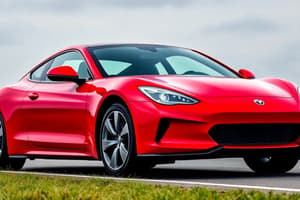Podcast
Questions and Answers
What motivates behavior?
What motivates behavior?
Motivation
What is the Latin word from which 'motivation' is derived?
What is the Latin word from which 'motivation' is derived?
movere
Which of the following are components of motivation? (Select all that apply)
Which of the following are components of motivation? (Select all that apply)
- Needs (correct)
- Incentives (correct)
- Drives (correct)
- Instincts (correct)
- Goals
The theory that assumes behavior arises from physiological needs is called __________.
The theory that assumes behavior arises from physiological needs is called __________.
Under Drive Reduction Theory, which need corresponds with the drive for eating?
Under Drive Reduction Theory, which need corresponds with the drive for eating?
Match the following types of drives with their descriptions:
Match the following types of drives with their descriptions:
What hormones are associated with the regulation of eating?
What hormones are associated with the regulation of eating?
What is the adaptive theory of sleep primarily concerned with?
What is the adaptive theory of sleep primarily concerned with?
Which type of motivation is defined as the act being fun or rewarding in itself?
Which type of motivation is defined as the act being fun or rewarding in itself?
What is the need for achievement (nAch) associated with?
What is the need for achievement (nAch) associated with?
What is Maslow's highest level in his hierarchy of needs?
What is Maslow's highest level in his hierarchy of needs?
Maslow's theory is based strictly on empirical research.
Maslow's theory is based strictly on empirical research.
Mihaly Csikszentmihalyi described 'flow' as a state of __________ experience.
Mihaly Csikszentmihalyi described 'flow' as a state of __________ experience.
Which of the following is NOT an element needed to achieve flow?
Which of the following is NOT an element needed to achieve flow?
Study Notes
Motivation
- Defined as the process driving and sustaining activity
- Originates from the Latin word "movere" meaning "to move"
What Motivates Behavior?
- Instincts: Biologically determined, innate behavior patterns.
- Needs: Requirements for survival.
- Drives: An urge to reduce unpleasant arousal caused by basic needs.
- Incentives: Rewarding conditions that motivate behavior.
Drive Reduction Theory
- Assumes that behavior arises from physiological needs, which create internal drives.
- Organisms are driven to satisfy these needs to decrease tension and arousal.
- Example: Feeling hungry (need) creates a drive to eat (behavior) to reduce the feeling of hunger.
Drive Reduction Theory Examples
- Hunger (Need) drives eating (Behavior)
- Thirst (Need) drives drinking (Behavior)
Drives: Two Types
- Primary Drives: Involve basic bodily needs (e.g., hunger, thirst)
- Secondary Drives: Learned through experience and conditioning (e.g., money, social approval)
Homeostasis
- The body's tendency to maintain a steady state.
- Negative feedback model: a system where deviations from a set point are detected and corrected.
Why Do We Eat?
- Physiological Component:
- Ventromedial Hypothalamus: Involved in signaling satiety (feeling full)
- Lateral Hypothalamus: Involved in stimulating hunger.
- Hormonal Activity:
- Insulin: Regulates glucose levels.
- Ghrelin: Stimulates hunger.
- Leptin: Signals satiety.
The Role of Hypothalamus
- Damage to the ventromedial hypothalamus can lead to obesity, as the body no longer receives signals of fullness.
Social Factors in Eating
- We eat even when not hungry due to social factors like:
- Social gatherings
- Emotional eating
Why Do We Sleep?
- Adaptive Theory: Sleep as a survival mechanism
- Restorative Theory: Sleep as a way to restore physical health and consolidate memories.
Stages of Sleep
- Rapid Eye Movement (REM) Sleep: Associated with dreaming.
- Non-REM (NREM) Sleep: Divided into stages with different brainwave patterns.
Incentive Theory
- States that people are motivated by external goals and rewards, rather than solely by physiological needs.
Two Types of Motivation
- Intrinsic Motivation: Enjoyment and satisfaction derived from the activity itself.
- Extrinsic Motivation: Motivation driven by external rewards (e.g., money, grades).
McClelland's Theory
- Proposes that people have three basic psychological needs that motivate their behavior:
- Need for Affiliation (nAff): The desire for social connections.
- Need for Power (nPow): The desire for control and influence.
- Need for Achievement (nAch): The desire for success and accomplishment.
Carol Dweck's Self-Theory of Motivation
- Connects the need for achievement to personality factors, particularly the view of self.
- Locus of Control: Refers to whether people believe they are in control of their outcomes (internal locus) or controlled by external factors (external locus).
Abraham Maslow's Hierarchy of Needs
- A humanistic approach to psychology focused on human potential.
- Proposes a hierarchy of needs, with lower-level needs needing to be met before higher-level needs can be addressed.
Maslow's Hierarchy of Needs Levels
- Physiological Needs: Basic needs for survival (e.g., breathing, food, water)
- Safety Needs: Security and stability.
- Love and Belonging Needs: Social connection and belonging.
- Esteem Needs: Self-esteem, confidence, respect from others.
- Self Actualization: The desire to achieve one’s full potential.
Peak Experiences
- Moments of temporary self-actualization, characterized by intense feelings of fulfillment and connection.
Limitations to Maslow's Theory
- Based on observations, not empirical research.
- The hierarchical order may not consistently apply (e.g., artists, scientists may prioritize self-actualization over lower-level needs).
- Limited validity across cultures.
Positive Psychology and Flow
- Mihaly Csikszentmihalyi: Focused on the concept of "optimal experience", known as "flow".
Flow
- A state of deep engagement and absorption in an activity, characterized by a sense of enjoyment, challenge, and effortless performance.
Elements Needed to Achieve Flow
- Clear goals: Knowing what needs to be done in each step.
- Immediate feedback: Receiving immediate and detailed information on progress.
- Balance between challenges and skills: The task is challenging but within the individual's capabilities.
- Action and awareness: The individual is fully present and focused on the task.
- Distractions are excluded: Minimizing external disruptions.
Studying That Suits You
Use AI to generate personalized quizzes and flashcards to suit your learning preferences.
Related Documents
Description
Explore the concepts of motivation and behavior in psychology with a focus on drive reduction theory. Understand how instincts, needs, drives, and incentives influence actions. This quiz will test your knowledge on these fundamental principles of motivation and their applications.




